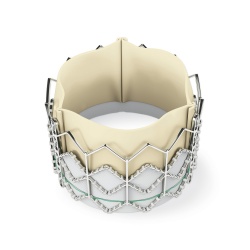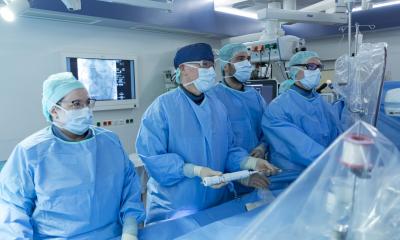Cardiology III
Restrictive ruling on cardiac procedure
In the future, TAVIs can only be carried out in German hospitals with cardiac surgery departments and cardiac wards, as decided by the German Government’s Expert Panel on Health (G-BA) last January. An interim arrangement in force until 2016 is anticipated for Heart Centres that currently carry out the TAVI procedure without cardiac surgery departments on site. The Federal Ministry of Health is still to confirm this decision.
Report: Bettina Döbereiner

The interdisciplinary G-BA justified a decision to restrict TAVI procedures to hospitals with cardiac surgery departments and wards by stating that complications following the procedure cannot be ruled out, and that in-patient aftercare provided by heart surgeons is therefore a necessity. The decision was taken in the context of a new G-BA guideline that sets minimum standards for minimally invasive aortic valve interventions in German hospitals.
Heart surgeons have therefore asserted themselves over their cardiologist colleagues with a demand that TAVIs should only be carried out in heart centres with cardiac surgery on-site, as per recommendations defined in the European Guidelines on Management of Valvular Heart Disease. In a position paper published last year, the cardiologists had argued in favour of allowing heart centres without cardiac surgery departments on-site to continue performing these interventions under certain conditions and in the presence of a cardiac surgeon (www.healthcare-in-europe.com/en/article/11713-transcatheter-aortic-valve-implantations-tavi.html).
As expected, when the decision was announced Professor Jochen Cremer, President of the German Society for Thoracic and Cardiovascular Surgery (DGTHG), welcomed this move. Professor Christian Hamm, President of the German Cardiac Society (DGK) also views the G-BA guidelines, along with the mentioned quality criteria listed in the DGK position paper, as a positive contribution towards quality assurance for TAVIs in Germany.
According to Hamm, there are currently 11 Heart Centres without cardiac surgery departments on site that carry out TAVIs - treating fewer than 5% of all patients undergoing this type of procedure. According to the definition of the G-BA interim arrangements, the centres are to continue with the provision of cardiac surgery through cooperation agreements until June 2016.
As for the indication for treatment, the new G-BA guideline confirms the guidelines as well as national and international recommendations currently in force. For patients with a low risk score, open surgery remains the procedure of choice; TAVIs should only be carried out for older patients and those classed as inoperable.
The Federal Ministry of Health is expected to pass the new G-BA guideline in coming months; only then will it be legally binding.
29.04.2015





